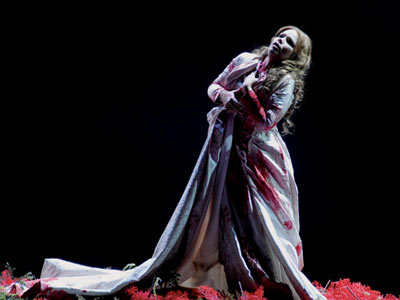 Its roots in South Florida go back to the time of Pearl Harbor, and it has stood as an artistic bulwark against financial challenges and shifts in the culture. Reliable in its offerings and quality, this art organization remains the yardstick by which so many other local art groups measure themselves.
Its roots in South Florida go back to the time of Pearl Harbor, and it has stood as an artistic bulwark against financial challenges and shifts in the culture. Reliable in its offerings and quality, this art organization remains the yardstick by which so many other local art groups measure themselves.
Florida Grand Opera will celebrate its 69th anniversary this year by offering one of its most exciting seasons ever. In a time of financial upheaval that sees other groups shutting down, FGO remains healthy. Its ongoing success is the result of a passion for the art and a healthy dose of determination.
“I think the founding of the company was a risk-adventure undertaking by Arturo di Filippo,” says Justin Moss, FGO’s Managing Director for Public Relations and Community Affairs. The present company is the result of combining the Greater Miami Opera (established in 1941) and The Opera Guild Inc. of Fort Lauderdale (established in 1945): They merged in 1994. With its history going back to WWII, FGO is the seventh oldest opera company in the United States.
Says Moss, “There were enough supporters here during the winter season in South Florida that they were able to get the company going. Because it was not only going to take ticket sales but contributions as well. Over the years, [di Filippo] was so tenacious. He never gave up. He was constantly knocking on doors and was able to develop a broad constituency that simply continued to grow all these years and has been able to sustain the company through all the ups and downs of the economy and social what-not.”
Anybody surprised at the popularity of opera, especially here in South Florida, should contemplate the sheer love many patrons have for this art. As much as South Florida is known for its tourism, it’s also much loved for the amount and quality of its cultural offerings – and that includes the fine arts.
“It’s true that people who come as tourists, the people who stay in hotels, are coming for other reasons. They come for the beach, to see nightclubs, to go fishing and all that sort of stuff. It’s a very, very small percentage of those people who come here who attend performances of the art organizations and support them. There’s another ‘transient’ population here, though, and that is a vast community of Central and South Americans and Caribbeans; people who maintain homes here. …These people do connect with the cultural institutions and take advantage of the offerings here.”
Moss echoes the sentiments of Edward Villella, the founding artistic director of Miami City Ballet. Both note that the demographics for their companies show a sizable attendance by Hispanic patrons. And there’s also the matter of increased attendance by younger visitors.
“When I first came here, almost 20 years ago,” says Moss, “there was a piece of shared wisdom: that the opera audience was elderly and white…and elite and dying off and whatever. Over the years, that absolutely has been proven false, because if you stand in the lobby of the Arsht Center, of the Ziff Ballet House, especially for a weekend performance…the audience as it comes in looks exactly like this community! I think the ethnicity breaks down just as it does in the census data, and it’s absolutely fascinating to see the inclusiveness. It’s fascinating to see the number of young people in their 20s and 30s who are coming to the opera.”
It takes a knowledgeable hand to make opera relevant to young people. The company, for the past 30 years, has maintained an outreach program where it stages a small, brief performance for high schoolers; anyone who went to a public high school in Miami-Dade County probably was exposed to professionally staged opera, which comes out now to about 50,000 students a year. “We also, through the public high schools, distribute dress rehearsal passes to about 1,000 students for each final dress rehearsal,” says Moss.
“You’re not going to make opera fans out of 400 students (per performance)! But there is going to be some in every assembly who connect with the art form, who have that epiphany and go, ‘Ah! This is what I’ve been missing all my life!’ If you do that for 30 years, all the time, regularly, eventually you’ll have made contact with enough people who really connect and resonate with your art form.”
It’s not just young patrons FGO wants to encourage, it’s new performers, too. The company has nurtured its Young Artist Studio program for years. A small group of young performers – generally just out of college or conservatory – is given acting and vocal coaching, language lessons, etc., during a 38-week residency, in addition to health insurance and housing. Guest artists are invited to work with them. At the end, these students perform on the main stage in a comprimario (supporting) role. They’re working with some of the leading artists in the world, receiving an invaluable education.
But sending opera companies out to schools for free performances and coaching talented hopefuls costs money. And money, especially these days, has become a rare commodity. In fact, fund-raising is a nightmare for many arts groups. The FGO budget is down to $10 million this year. (For the 2007-08 season, it was $16 million.) The company, the seventh largest in the United States, has handled the problem in part by dismissing a couple of performers, but it still depends upon its donors to take up the slack.
An impressive harbinger, however, is ticket sales for the 2009-10 season, which have held steady. Says Moss, “We were concerned because when we went out with our subscription renewals, for the current season, it was the worst part of the economic crisis, where people were just frantic. But, you know, we had to get out there, and we did. And it was a slower process than in the past, but we were able to achieve 80 percent of all of our subscriptions from the previous season. Just about the highest benchmark any performance art organization can achieve.”
Moss is alluding to the absolute loyalty of the company’s supporters, whom it didn’t want to disappoint. In view of what was happening financially, the company decided on selections that had the broadest possible public appeal. To that end, the season offers Leoncavallo’s Pagliacci and Puccini’s Suor Angelica on a double bill. American soprano Kelly Kaduce performs in both productions.
Soprano Eglise Gutiérrez, a Cuban-American, will perform the title role in Donizetti’s Lucia di Lammermoor. Rossini’s The Barber of Seville will be presented with soprano Sarah Coburn, who returns to FGO after successfully combining her talents last year with acclaimed bass-baritone Bryn Terfel.
The final opera will be Bizet’s Carmen, which will showcase three FGO debuts: American mezzo-soprano Kendall Gladen as Carmen, tenor Adam Diegel as Don Jose and Miamian Elaine Alvarez, a soprano, as Micaëla.
In conjunction with Carmen, FGO will conduct a new program called “Opera Free-For-All.” Having been awarded a Knight Arts Foundation grant recently, FGO will use those funds to hold a drawing for free tickets to a non-subscription performance of Carmen. Some 2,200 tickets will be allotted for the public. Those entries not receiving free tickets will get a code entitling them to purchase a ticket to a different performance of Carmen at a discount.
As Moss notes, “That’s nearly the entire house of the Ziff. We hope there will be many more who enter the contest than win. We’ll get to them with special offers and try to make it possible for them to attend a performance of Carmen.”
It’s impressive, this desire to share opera with, well, just about everybody. Why are opera followers so impassioned? Moss is emphatic: “Opera fans are among the most loyal people in the whole of the world. Over the years, opera fans have developed such a relationship with the art form, they have learned as much as they can about it. And their rewards for attending live performance are so great that it appears to be one of the last things they’re willing to give up. And that’s because the experience is really unlike anything else in the world. “Here’s an experience that’s both physical and thrilling – when you’re sitting in the opera house, hearing a live performance, there’s no substitute; nothing like it in the world!”



 At the May 19thm, 2009 meeting of the Florida Grand Opera Board of Directors, Victor H. Mendelson was elected President of the Board of Directors, succeeding Jane A. Robinson, who was elected Chairman of the Board of Directors following her five years as President.
At the May 19thm, 2009 meeting of the Florida Grand Opera Board of Directors, Victor H. Mendelson was elected President of the Board of Directors, succeeding Jane A. Robinson, who was elected Chairman of the Board of Directors following her five years as President.
Be the first to comment